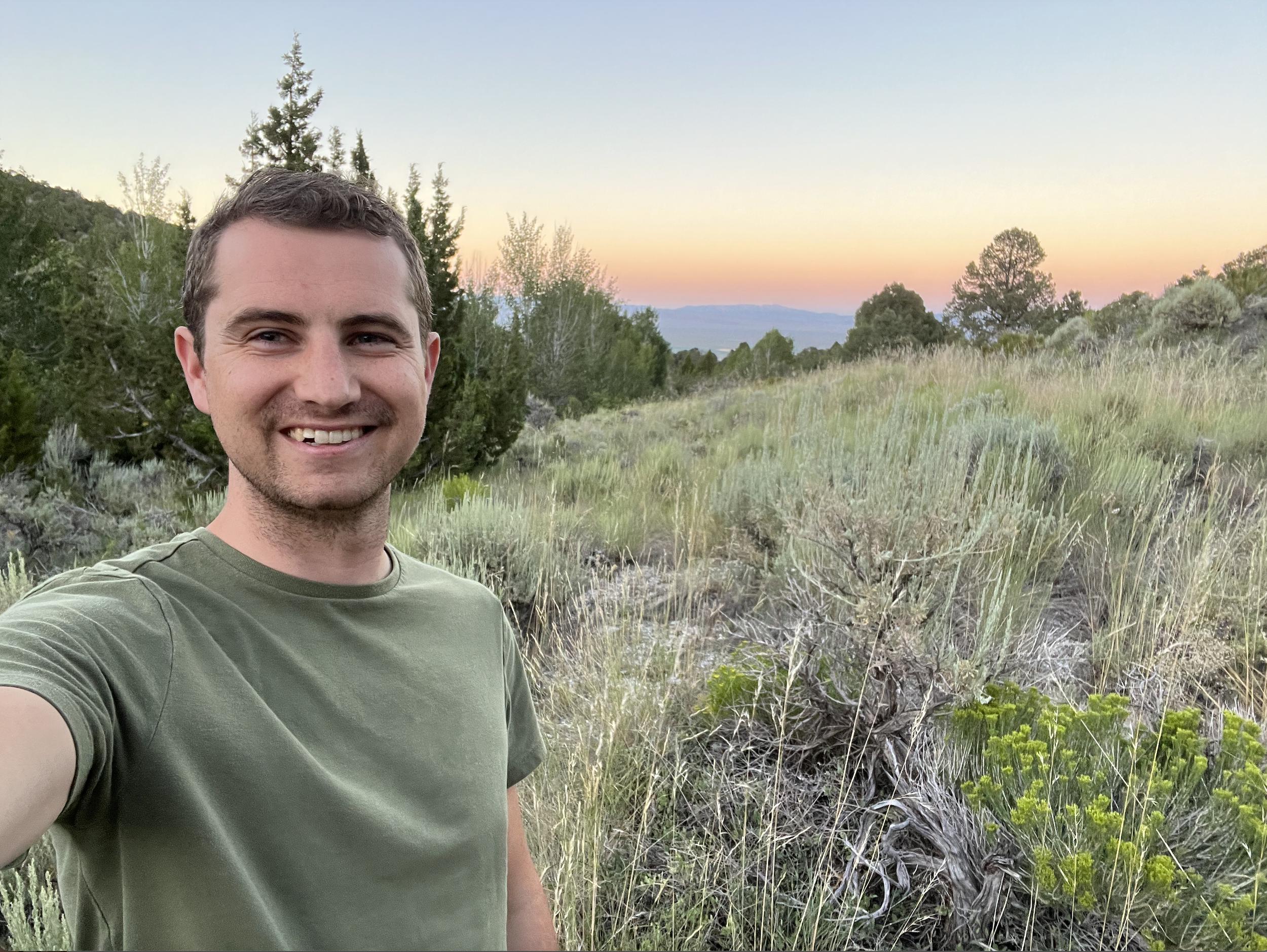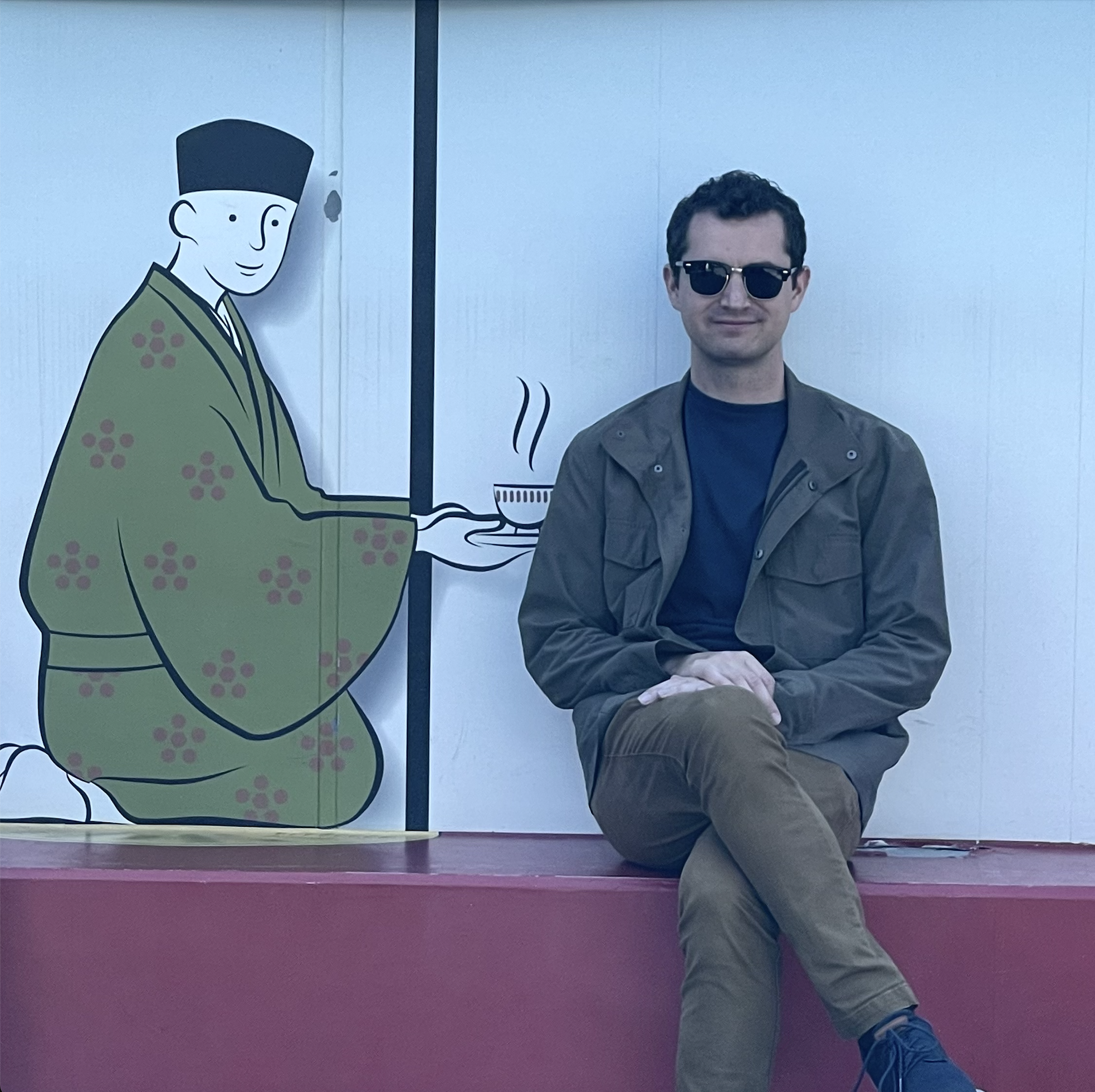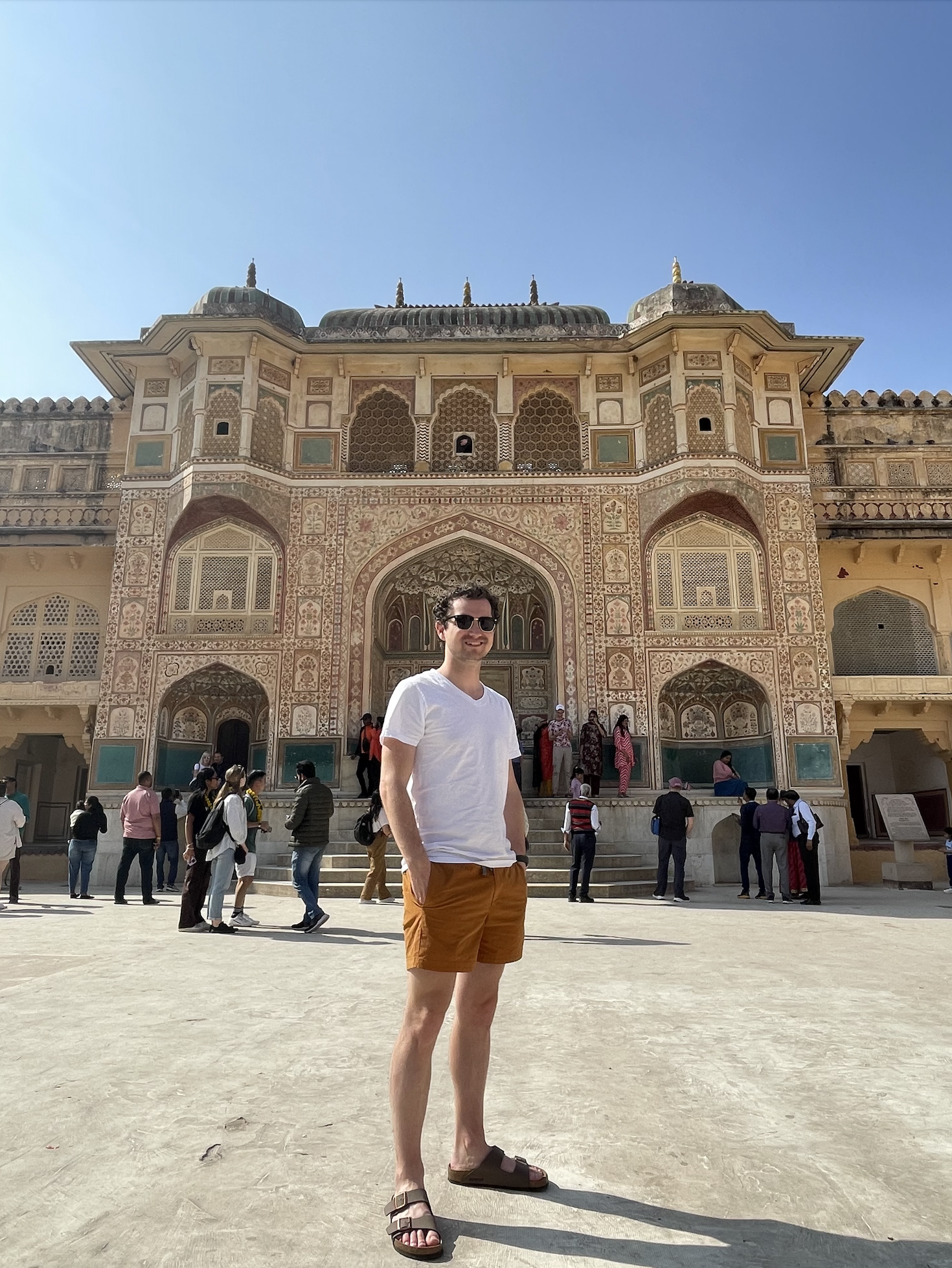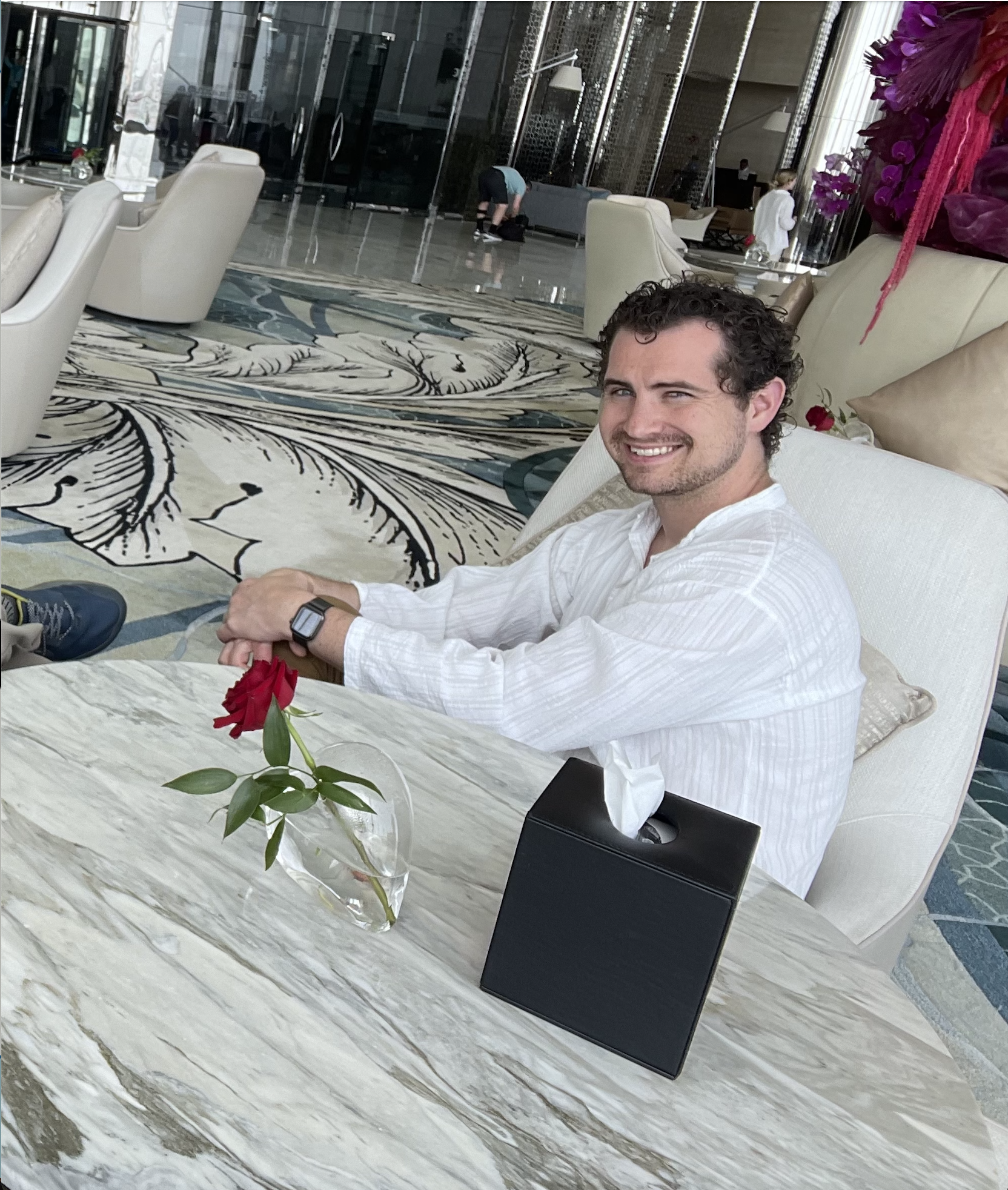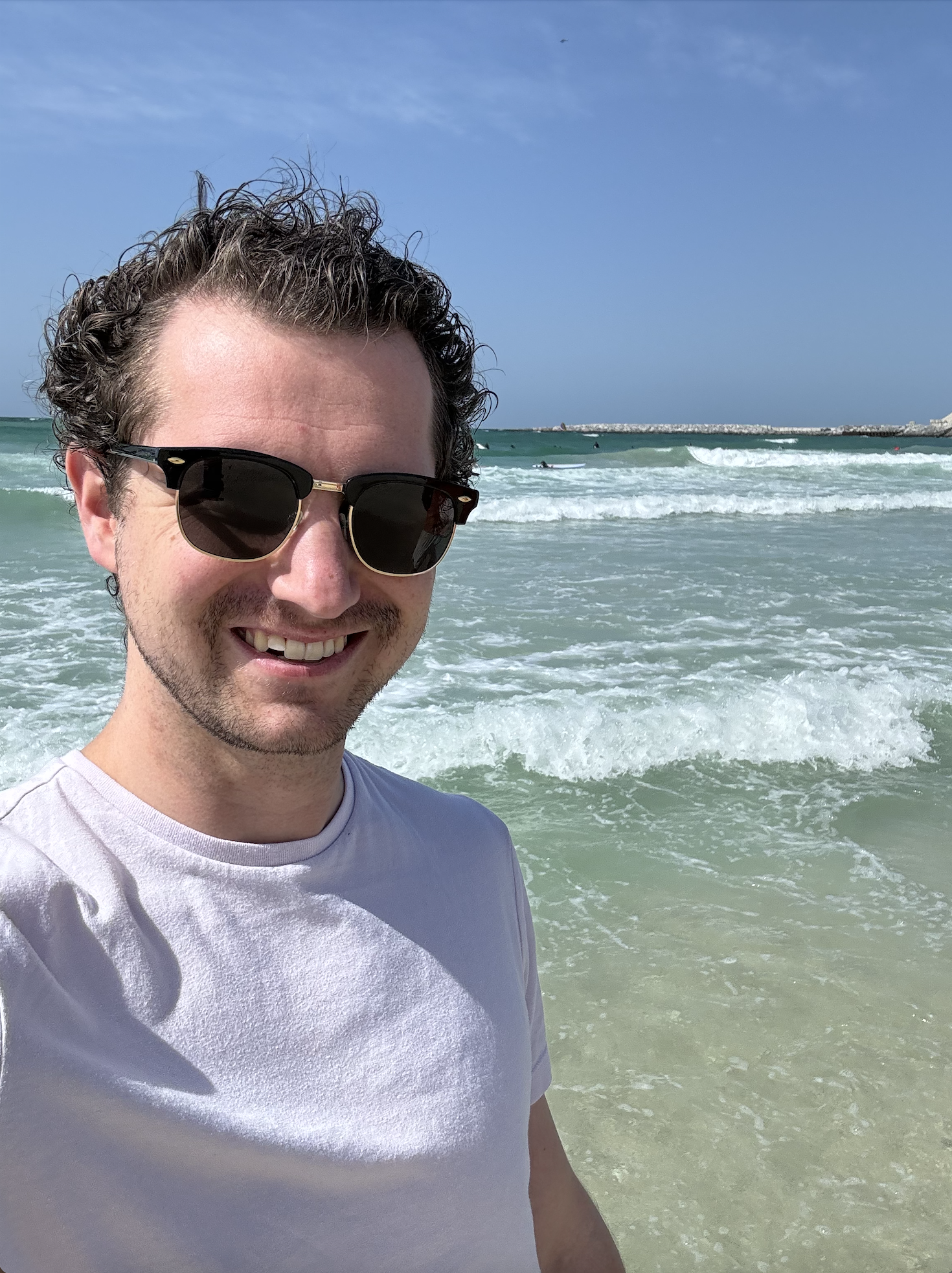Austin Peterson’s Spanish Fork, UT upbringing was one in which he believed what he was taught, and he often faked what he didn’t feel to fit in with the other guys who surrounded him. He convinced himself that the draw he felt toward some of his male peers in middle and high school was presumably because he was envious of them. When friends would ask which of two actresses was worthy of celebrity crush status, Austin would respond, “They’re both fine.”
After high school, Austin did all the things expected of him and more. He went on an English-speaking mission to Accra, Ghana, where he also learned various tribal dialects and ASL. Always a top student, he graduated from BYU in linguistics and also studied for a year in Germany. A few years ago, he was on a Terryl Givens kick, reading all of his and Fiona Givens’ books. One day, Austin tuned in to listen to Terryl being interviewed on Charlie Bird and Ben Schilaty’s “Questions from the Closet” podcast. This opened a whole new dimension for him. One podcast turned into a binge fest in which Austin turned up the volume and his inner awareness as he heard the anecdotes of two active LDS, gay men who had experienced many of the same thoughts and feelings Austin had always pushed away. Austin recalls, “Theirs aligned so closely to my experiences, I felt like they were reading them.” But Austin had always believed being gay was a choice, and since he had not “chosen” to be gay, therefore, he couldn’t be.
As time passed, Austin crossed paths with Ben on several occasions as they shared mutual friends. One night they ended up at the same movie night. Ben made a comment about the attractiveness of one of the male actors, and it shook Austin. After stewing awhile, he reached out to Ben, and over lunch on BYU campus, at age 26, Austin came out for the first time ever--to Ben. Shortly after, Ben linked Austin with a friend who was also queer and looking for a place to stay, and Austin’s new roommate became the second person he ever confided in.
Austin recalls, “Gradually, I became more comfortable in my own skin and with queerness in general, and I began to let more people into my life.” He had already built a close friend network of those who would be supportive, and they were. Austin’s younger brother is gay and had been out for about ten years, so Austin found his family to be both comfortable with and supportive of his news. Austin felt a bit more anxious, though, about opening up to his ward, as he had recently been called in by the entire stake presidency and asked to serve as second counselor in the bishopric. At the time of that interview, he did not feel ready yet to share he was gay, but a few months later, when it was his turn to conduct December’s fast and testimony meeting, Austin felt compelled to open up to the ward family he loved all at once rather than in multiple phases. At the podium, he shared how difficult it was for him when some people say “the gospel is not a buffet where you can pick and choose what works for you,” because “being a gay member of the church, some of the doctrines don’t fit with me as a person.” An avid scriptorian who hosted a weekly Genesis study night, Austin continued to share how much he loved the story of Enoch in the Pearl of Great Price in which God weeps and switches the two great commandments to emphasize the need for people to choose to love. Austin concluded his remarks by saying that was his priority and the “one thing I know.”
After that meeting, some complaint calls were made by ward members, with one stating he should no longer be allowed to work with children and youth, and another saying, “I don’t know if I need to talk to the bishop or stake president, but this needs to be fixed.” Luckily, Austin’s entire bishopric were good friends who knew him well and proved fully supportive. The executive secretary, a close friend, conferred with his own kids and the deacon’s quorum with which Austin had served to make sure none of them had a problem with Austin continuing to serve. No one did.
A member of the stake presidency had been on the stand when Austin came out. At the next quarterly stake leadership training meeting, Austin’s Orem stake president took some time to pass along several teachings he had apparently heard at a training with some general authorities that advised that any youth who identified as trans needed to be visited by their bishopric so they could read the Family Proclamation together in their living room. The next month, Austin filled in for the bishop at a meeting with the stake president who again spent 45 minutes belaboring the point that youth identifying as bi or trans should not be believed, and that the statistics of increased mental health risks and suicide rates for LGBTQ+ youth were false. He continued to say youth identifying as trans should not participate in any gender specific activities or the temple unless they were presenting as the sex assigned at birth. His final counsel was that the handbook would clarify anything else, making “difficult things no longer difficult,” and that “no blessing would be denied to those keeping their covenants.” Austin walked away feeling this was pretty heavy counsel to give to those identifying as LGBTQ+.
Shortly after, Austin found himself falling into a depression. For several weeks, he struggled to sleep, focus, or fulfill his work duties as a business analyst. In questioning the source of his emotions, he traced their timing to the training with the stake president. He had loved working with the youth in the church and serving as an advisor capable of planning a night of activities like crab soccer for fun and fellowship while also giving advice about school and how to build healthy connections. Austin weighed how leaving the church would hurt his abilities to make a meaningful impact, but also knew it’d be painful to stay. “It was a balancing act to determine which would hurt more,” he says. “As long as it hurt more to leave, I chose to stay.”
And then, he attended another devotional. Last June, thousands of YSA around the globe tuned in to hear the counsel of President Dallin H. Oaks and his second wife, Kristen Oaks. In the discussion, President Oaks spent the first half praising all things marriage, young marriage, and the happiness that comes through marriage. He then pivoted to direct the second half of his remarks to expressing the need to “love” and “respect” LGBTQ+ people, while using us vs. them language and reading a letter by a young adult woman that Austin felt painfully othered the LGBTQ community in a way in which many likely left feeling the overall message was, “You can only find happiness in marriage, but if you’re gay, it’s not for you.”
Austin had already witnessed the fallout from Elder Jeffrey R. Holland’s “musket talk,” one delivered at a time in which he was still closeted but observed several friends express their hurt and extend comfort to each other. But after President Oaks’ YSA address, in the mental state he was in, Austin decided he just couldn’t do it anymore. It was a difficult choice to leave the church, as he had been looking forward to serving as an FSY counselor again that summer, something he had enjoyed doing the year prior. But Austin considered how as a member of a bishopric, one has to maintain a temple recommend which includes sustaining church leaders. While he was able to rationalize how sustaining can mean wanting the best for a leader or being willing to hear and obey them, Austin decided he was no longer ok with anyone believing he sustains some of the harmful rhetoric that was shared. As his recommend was up for renewal that month, Austin quietly let his bishop know, without getting into too many specifics, that he would need to find a replacement, as much as he had loved serving in his ward.
Austin also requested a meeting with his new stake president just to let him know how damaging his predecessor’s words had been. As Austin had at that time been volunteering behind the scenes fielding the emails for the “Questions from the Closet” podcast for about a year, he was able to share widespread feedback and best practices. The new stake president took notes from their conversation, asked follow-up questions, and proved to be “amazing.” Austin respects how that stake president took a proactive rather than reactive approach to LGBTQ+ issues, preparing himself for what might come so he could be a positive support to future young people like Austin craving spiritual support. A couple weeks later, the stake president honored Austin’s wishes and released him. Austin was wrapping up his final month of conducting and assigning speakers and musical numbers and now jokes that “because I can be dramatic,” he scheduled himself to play the same piano medley he had played at his mission farewell, a medley of “Consider the Lilies” and “God Be with You ‘Til We Meet Again.”
After Austin’s release and stepping away from the church, he still honored the arrangement for the youth to use his apartment’s pool, and he still regularly goes to lunch or dinner with friends from the bishopric. He also still teaches piano lessons on the side to several youth and adult ward members, with whom he has remained friendly. While Austin says he once spent a lot of time in councils trying to dissuade people from leaving or “calling in lost sheep,” he is now more a proponent of the mindset that if people want to leave, it’s good to give them the freedom to do so, knowing their ward will be there for them if they decide to come back.
Anticipating his first Sunday home to be difficult, Austin arranged to go on a long bike ride around town to distract himself. But he was surprised to see that for the first time in months, he didn’t feel angst and he was able to gently move on, just enjoying nature. He also enjoys skiing, pickleball, binging “bad teen dramas like Vampire Diaries, Teen Wolf, and other shows unrealistically cast with 30-year-olds,” and he occasionally gets on Minecraft. At 28, while he’s dated a few guys, he’s mostly just gone on a bunch of first dates and considers himself “single and open.” And now, when asked what advice he’d give his younger self, Austin marvels at the capability some young people have to be open and allow themselves to actually consider their options and choose their own beliefs. He remembers once being shocked to hear someone say he believed gay people should be able to get married in the temple. He thought, “You can believe that? We’re allowed to think outside what we’ve been taught?”
As a youth, Austin had never entertained the mindset the church might not be true. It was a seismic shift for Austin when he finally came to terms with being gay and considering his options to either “do everything the church teaches and die a little each week with no relationship, or die and marry a woman and have offspring for eternity, or be gifted to one of those people as a servant.” He rationalized then that, “If the church was true, I could do the alternative of living by my own values and choosing the life I want, then die and go to the telestial kingdom with the rest of the gays and have a party. For me, with the church’s Plan of Salvation, it still felt better for me to leave than subscribe to it if it was true.” A long-time historian who once considered majoring in ancient studies, Austin is now enjoying this period of open-minded discovery--of studying and respecting others’ beliefs. Of learning to form his own opinions and trust his own path.
















